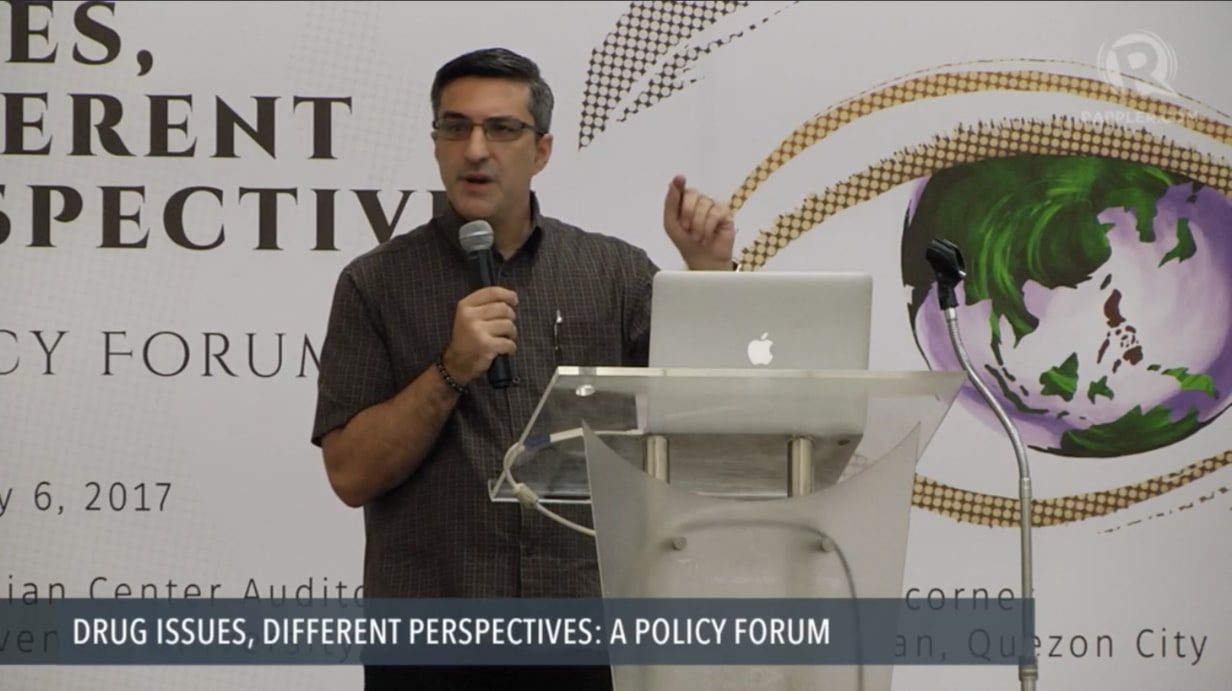SUMMARY
This is AI generated summarization, which may have errors. For context, always refer to the full article.

MANILA, Philippines (UPDATED) – An Argentinian priest who has served depressed communities in the Philippines for the last 20 years believes drug rehabilitation advocates can work with the Duterte administration in “healing” drug addicts.
Father Luciano Felloni, known for his “healing not killing” community-based rehabilitation program in his parish in Caloocan City, delivered what he called his “big message” at the Drug Issues, Different Perspectives drug policy forum on Saturday, May 6.
“We can work with Filipino government successfully. It’s difficult but it’s possible….We should build bridges rather than walls,” he said.
Felloni said working with the government is one of the 3 premises of the rehabilitation program that he started in his parish in Caloocan City in September 2016.
“Fighing the government will bring us nowhere….We will suffer a lot if we fight with the government, we will benefit a lot if we work with the government,” he said.
The two other premises, he said, are having a “holistic approach to the drug problem,” since be believes that the drug issue “is neither a police nor a health issue” but a developmental issue; and that “drugs are our enemies, not each other.”
No to big rehab centers, anti-drug war rallies
Felloni is known for his community-based rehabilitation program (CBRP) in Our Lady of Lourdes Parish in Camarin, Caloocan City. He said there were as much as 5 drug-related killings in his parish every week when the government’s war on drugs began but the number dropped since the program began.
For Felloni, “building big rehab centers” or staging protests against the government’s drug war would not help solve the drug problem, as it would be more productive to “go to the ground and work.”
To prove that working with the government is possible, he cited his ongoing cooperation with local officials and police for his community rehab program.
He also noted that the first donor to the program is a policeman, a parishioner, who committed to contribute P500 a month.
Felloni said helping drug addicts is possible with a “proactive perspective” that “it’s possible to do more than complain, it’s possible to do more than blaming the government.”
He shared that he had even encounterted some “international media” who interviewed him on the Philippine drug war and were “trying to force me to say that all evil comes from Duterte and we are all against Duterte.”
In response, Felloni said he told them that his focus is on providing people with rehabilitation. “Let Duterte alone. We are saying it is possible heal them (drug addicts). Why force the issue on fighting the goverment?”
The Philippine leader has been criticized for his pronouncements on “killing” drug addicts and the rising death toll in his war on drugs. (READ: Shoot to kill? Duterte’s statements on killing drug users)
‘Visit the people’
During his talk, Felloni also cited the importance of going to communities beset by drug problems. Addressing the participants in the forum, many of whom were from the academe, the priest said that “the solution on drugs cannot come from intellectual debate; it has to be based on reality.”
“I think we have too many people talking about drugs without even knowing the name or the face of the drug addict,” Felloni said. “And that’s where our conversation [shoots] up to the academic level without considering the reality on the ground. Visit the people.”
This prompted United Nations Special Rapporteur Agnes Callamard, a guest at the forum, to take up the cudgels for all academics there.
“I think you have a very narrow understanding of academic work,” Callamard told Felloni during the open forum. She argued that the experience and findings of academics are just as “community-grounded” as his.
“They [academics] go to the ground, they speak with people, they live with the people,” Callamard said. “I don’t know where you’re coming from to think that academic work is done somewhere in an ivory tower. That’s not the case,” she added.
During the forum, Carlos Conde, Philippines researcher for Human Rights Watch’s Asia Division, criticized Felloni, saying that “the problem is not just with drugs.” He stressed that the problem was both structural and historical.
“We’re talking about a breakdown in these communities, breakdown of law and order, breakdown of the criminal justice system, police corruption, impunity,” Conde said.
“If you’re going to be so serious about this community-based rehabilitation thing, you also have to look into the other actors here, the local officials, not just the drug users. Not all drug users are drug addicts,” he added.
Human Rights Watch earlier released a report which alleged that the Philippine National Police (PNP) is behind the extrajudicial killings in the government’s drug war. It had urged United Nations Human Rights Council to pressure the Philippine government into supporting an international investigation into the country’s brutal war on drugs.
Watch highlights of the forum here. – Rappler.com
Add a comment
How does this make you feel?
There are no comments yet. Add your comment to start the conversation.